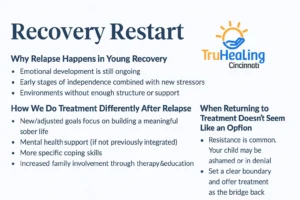You thought you’d turned a corner.
Maybe your child completed treatment. Maybe things felt steady—for a while. Then the signs crept back in: missed calls, withdrawn behavior, old friends reappearing. The moment you’d hoped was behind you suddenly feels like it’s starting all over again.
Relapse isn’t what any parent wants to see. It can feel like failure—yours, theirs, or everyone’s. But it’s not.
At TruHealing Cincinnati, we work with families who have been through this exact storm. Parents who’ve supported their child through recovery, only to be faced with the confusion, grief, and fear that relapse brings. This time, it doesn’t have to be like the last time. And it doesn’t have to break you.
Why Relapse Is Common—But Still Hard to Face
Relapse doesn’t mean the first treatment “failed.” It means the disease showed up again. Addiction is chronic, and recovery is nonlinear. Like any condition, it often takes multiple rounds of care, new strategies, and different timing.
For young adults, relapse is especially common—and complicated. They’re still developing emotionally. Their environments often lack structure. And their ability to manage stress, disappointment, and triggers is still in progress.
That doesn’t mean they’re doomed. It just means the path forward has to include a little more truth, and a little less shame.
How Alcohol Addiction Treatment Shifts After Relapse
When your child goes back to treatment after a relapse, they’re not starting from scratch. They’re walking in with new experience, pain, and (often) a little more honesty. That matters.
Here’s how treatment changes post-relapse:
- New assessments help identify what was missed before—like untreated anxiety, trauma, or emotional dysregulation.
- Treatment goals shift from just “stopping drinking” to building a stable, meaningful life worth staying sober for.
- More specific coping skills are introduced. Your child isn’t a beginner now—they may be ready for deeper work.
- Family support increases. Because if the whole system doesn’t change, the old patterns creep back in.
We’ve had clients say, “The second time, I actually heard what people were saying. I wasn’t trying to prove anything. I just wanted to stop hurting.”
That’s the moment when real change begins.
Reframing Relapse for Your Family
Relapse doesn’t cancel progress. But it does test hope. As a parent, you may feel everything from anger to exhaustion. That’s normal. What helps is knowing that relapse isn’t just about what went wrong—it’s about what needs more support.
Ask:
- Did your child leave treatment too soon?
- Were they overwhelmed by school, work, or life stressors?
- Was mental health care (like depression or trauma treatment) fully integrated?
- Did your family have enough support to set and maintain healthy boundaries?
These aren’t blame questions. They’re directional questions—because if something cracked under pressure, we can reinforce it this time.

How to Support Your Child Without Losing Yourself
When your child relapses, it’s tempting to jump back into fixer mode. But what they need isn’t more control—it’s more clarity.
Here’s what helps:
- Boundaries. Saying, “I love you, and I won’t support drinking in the house” is a boundary—not a punishment.
- Consistent communication. Even if you’re hurt, staying gently connected can keep the door open.
- Therapy for yourself. Relapse affects everyone. You’re allowed to have space to feel and heal, too.
- Education. Learning about addiction and relapse reduces shame and increases effectiveness.
- Involvement in treatment. At TruHealing, we invite parents into the process through family sessions and updates (with your child’s consent).
When Your Child Resists Returning to Treatment
It’s painful to watch someone you love refuse help—especially after they’ve already had it.
Here’s what we tell parents in that spot:
- Resistance doesn’t mean they’re lost. It often means they’re ashamed, scared, or in denial.
- Try not to beg or bargain. Set a clear boundary, and offer treatment as the bridge back.
- Remember, your actions matter more than your words. When you stop enabling and start holding the line, change becomes possible.
- We can help. Our team is experienced in guiding families through these moments. Whether your child is ready or not, you can still reach out for support and strategy.
How TruHealing Cincinnati Supports Relapse Recovery
Every program claims to “understand relapse.” But at TruHealing, we structure our care around the reality that relapse is common—and treatable—with the right approach.
Here’s what we offer:
- Personalized treatment plans that adapt to your child’s history and needs
- Integrated mental health care for anxiety, trauma, depression, and more
- Evidence-based therapy like CBT, DBT, and trauma-focused models
- Outpatient and intensive outpatient programs (IOP) that support real-life reintegration
- Family therapy and education, because recovery doesn’t happen in a vacuum
- Ongoing support after discharge, so your child isn’t dropped when treatment ends
We also provide access to services across our network, including Lexington and Lawrenceburg, Kentucky, if proximity or logistics require local care.
What Success Looks Like After Relapse
Success might not look like immediate abstinence. It might look like:
- Going to treatment without being pushed
- Naming feelings instead of drinking through them
- Returning to group after missing a session
- Calling home and saying, “I messed up. But I want help.”
- Showing up with more truth, even if it’s messy
One mom told us:
“I didn’t get the perfect version of him back. But I got my son back. The one who tries. The one who asks for help.”
That’s recovery.
FAQs: Treatment After Relapse
Is it normal to relapse after treatment?
Yes. Especially for young adults, relapse is often part of the recovery journey. It’s not a sign of failure—it’s a sign that more support or a new approach is needed.
Should my child return to the same program or try a new one?
It depends. If your child had a strong therapeutic connection and felt supported, returning may help. But if the program didn’t meet their needs or felt like a poor fit, a new setting might offer more engagement.
What if my child refuses treatment after relapsing?
They may feel ashamed or discouraged. Focus on boundaries and options. You can’t force willingness—but you can create an environment where recovery feels possible again. Our team can help guide you through this.
How involved should I be this time?
Involvement matters—but so do boundaries. Treatment works best when families are engaged but not enmeshed. We’ll help you find that balance through sessions, education, and support.
How long is treatment after relapse?
It varies. Some young adults may benefit from a few months of outpatient care. Others may need a higher level of support. What matters most is sustained engagement and a plan for continued support post-treatment.
Still Holding Hope? So Are We.
Call (888) 643-9118 or visit our Alcohol Addiction Treatment page to learn more about how we support families and young adults after relapse. You don’t have to start from zero. And you don’t have to do this alone.

